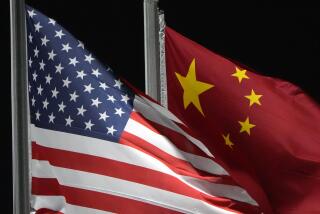U.S. Slaps Sanctions on Russian Arms Maker for Sales to Tehran
- Share via
MOSCOW — The U.S. on Tuesday imposed sanctions on a leading Russian arms manufacturer for selling laser-guided artillery shells to Iran, sending a clear signal that the Bush administration is prepared to use economic muscle to prevent the transfer of new weapons technology to the Islamic Republic.
In an action the State Department said was aimed at controlling the spread of lethal weapons to nations identified as state sponsors of terrorism, the United States waived sanctions against the Russian government but banned all new licenses for and transactions with state-owned manufacturer Tula Instrument Design Bureau, a leading producer of antitank missiles used this year against U.S. forces in Iraq.
The move was immediately denounced in Moscow as an attempt by the U.S. to ramp up pressure, in advance of a Sept. 26 summit between President George W. Bush and Russian President Vladimir V. Putin, for Russia to halt construction of an $800-million nuclear power plant at the Iranian port of Bushehr.
“We are not going to buy anything from the United States. So these sanctions will not harm us,” Leonid Roshal, Tula’s deputy director, said in a telephone interview. “It is clear that they want first of all to attack our president, because after all, it is our president who ultimately decides what and where Russian weapons are sold.”
With the lingering standoff over the Bushehr facility, which U.S. officials believe could aid Iran in developing nuclear weapons, Russian analysts said the Bush administration appears to be signaling that it will pursue all avenues to halt Russia’s involvement in the project.
“The Americans want to make the point that anything in relations between Russia and Iran is regarded as a problem by the U.S. administration,” said Ivan Safranchuk, director of the Russian branch of the Washington-based Center for Defense Information.
U.S. officials denied any connection between the curbs announced Tuesday and the Bushehr nuclear plant. Ron Parson, spokesman for the State Department’s Office of Export Controls and Conventional Arms Nonproliferation Policy, said the decision was a simple determination to enforce a U.S. law against transferring lethal weapons to states that sponsor terrorism.
“We have a lot of proliferation issues with the Russians, large, medium and small, and a very big one is with the Bushehr nuclear power plant. But that’s not connected with this at all,” Parson said.
U.S. officials are concerned about Iran acquiring laser-guided artillery shells, Parson said, because they are far more likely to hit their targets than conventional shells. “They are extremely accurate and quite powerful, quite lethal,” he said.
“We will continue to work hard with the Russians to seek an end to all transfer of sensitive weapons and technologies by Russian entities to state sponsors of terrorism, including transfers of conventional weapons that could aid terrorists or threaten the U.S. and our interests and allies,” said State Department spokeswoman Brooke Summers.
There was no official comment from the Kremlin, which technically was a target of the sanctions as well, since Tula is a state-owned company. U.S. officials said they were waiving the sanctions against Russia through a finding that it was in America’s interest to do so.
The order imposes a one-year ban on all American government assistance to, contracts with and licenses for Tula, which has little or no economic contact with the U.S. government.
The company has twice before been the subject of U.S. sanctions, in 1999 and 2002, although the State Department has not disclosed what weapons or countries were involved in the previous actions.
Roshal, Tula’s deputy director, said he believes the sanctions are intended to affect the company’s ability to sell on the world market its well-known Kornet-E antitank missiles, which have been successfully used against U.S. forces in Iraq. The Pentagon said this year that Iraq may have secretly bought up to 1,000 of the Russian missiles.
“Our missiles have no real competition in the world, and they are basically the only missile of its kind which can destroy U.S. tanks,” Roshal said.
Progress on the Bushehr project was stalled this month due to Russia’s requirement that Iran return all spent fuel from the reactor to prevent its use in weapons production. Iran, Russian officials said, is now demanding that Moscow pay for the spent fuel, raising fears that Iran may be preparing to go it alone on producing fuel for the reactor. Such a move could present a “huge nonproliferation issue,” a U.S. official said.
But the Kremlin’s nuclear power minister, Alexander Rumyantsev, said Tuesday that the two sides are near to closing the deal. “We will agree. We don’t have any contradictions,” he said at a news conference in Vienna.
He added that there is still no proof that Tehran has the technical ability to build a nuclear weapon. Tehran insists that its nuclear program is aimed only at generating electricity.
U.S. officials are hopeful that they will be able to convince Russia of the danger of helping Iran expand its nuclear capabilities. A senior U.S. diplomat in Moscow said Tuesday that there are signs Russia is beginning to see Iran as a potential threat.
“I do think the Russians are more and more wary of what the Iranians may be doing and share our concern about the importance of cooperating with the International Atomic Energy Agency” on inspections, said the official, who spoke to reporters on condition of anonymity.
*
Times staff writer Sergei L. Loiko contributed to this report.
More to Read
Sign up for Essential California
The most important California stories and recommendations in your inbox every morning.
You may occasionally receive promotional content from the Los Angeles Times.










